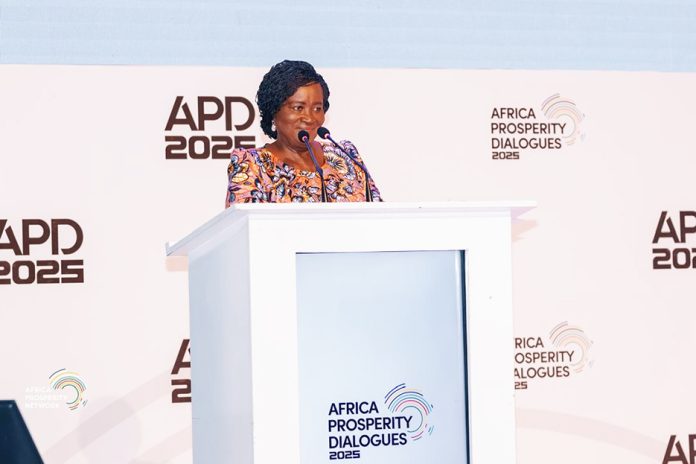Vice President, Professor Naana Jane Opoku-Agyemang has called on African leaders to demonstrate strong collective will and take decisive action to ensure the successful implementation of the African Continental Free Trade Area (AfCFTA).
Addressing over 4000 delegates and more than eight Heads of State during the Africa Prosperity Dialogue (APD 2025) at the Accra International Conference Centre on Thursday 30th January, 2025 Prof. Opoku-Agyemang emphasised that the single market presents a transformative opportunity for Africa’s economic growth, but its success depends on the commitment and collaboration of all stakeholders.
“The success of the single market depends on our collective will and decisive action. We must accelerate progress to ensure that Africa’s gains are realized for this generation and the future ones,” she stated.
She urged policymakers, business leaders, and development partners to prioritize cooperation, share ideas, and work towards the seamless integration of African economies.
According to her, eliminating trade barriers, enhancing infrastructure, and investing in digital connectivity will be critical in realizing the full potential of the single market.
“As we engage in today’s sessions, I encourage all of us to collaborate, to exchange ideas and to push Africa closer to a fully integrated market,” she added.
Prof. Opoku-Agyemang reiterated that a successful single market will not only boost intra-African trade but also drive industrialisation, create jobs and position the continent as a competitive global economic player.
Prof. Opoku-Agyemang emphasised that Ghana’s modernisation of its ports was aimed at boosting trade, while ongoing expansion of road and rural networks seeks to connect key economic zones.
“Our airports are one of the best on the continent, I must admit. Our ports are being modernised to facilitate trade and we are expanding our road and rural networks to connect key economic zones,” she stated.
She further underscored Ghana’s investments in energy infrastructure, which are designed to provide reliable and affordable power to industries and households.
She commended President Mahama for his commitment to infrastructure development, describing it as a key driver of Ghana’s economic transition.
However, she acknowledged that while progress had been made, there was still much to be done across Africa.
She pointed to digital infrastructure as a critical area for investment, noting that mobile technology had already revolutionized financial inclusion across the continent.
Dr. Fatima El Sheikh, the Secretary General of the Arab Bank for Economic Development in Africa (BADEA), who also addressed that gathering, said the institution has invested more than $15 billion in Africa to date, with the bulk of the funds directed towards infrastructure development.
Dr. El Sheikh pointed out that over 60% to 70% of BADEA’s investments had been focused on key infrastructure projects across the continent.
“We are proud of our efforts, especially in building essential transportation networks. Over 40 airports have been constructed, and we’ve developed what we call ‘isolation liberation roads’—roads that connect landlocked countries to ports and facilitate access to the sea,” she explained.
Dr. ElSheikh further emphasised the bank’s commitment to the continent’s continued growth, outlining BADEA’s new ambition for the next five years.
“We have recently launched a five-year plan, with an allocation of $18 million, aimed at continuing our infrastructure development initiatives. The focus will be on building on our existing projects and ensuring that more African nations benefit from better connectivity and access to global markets”, she added.









